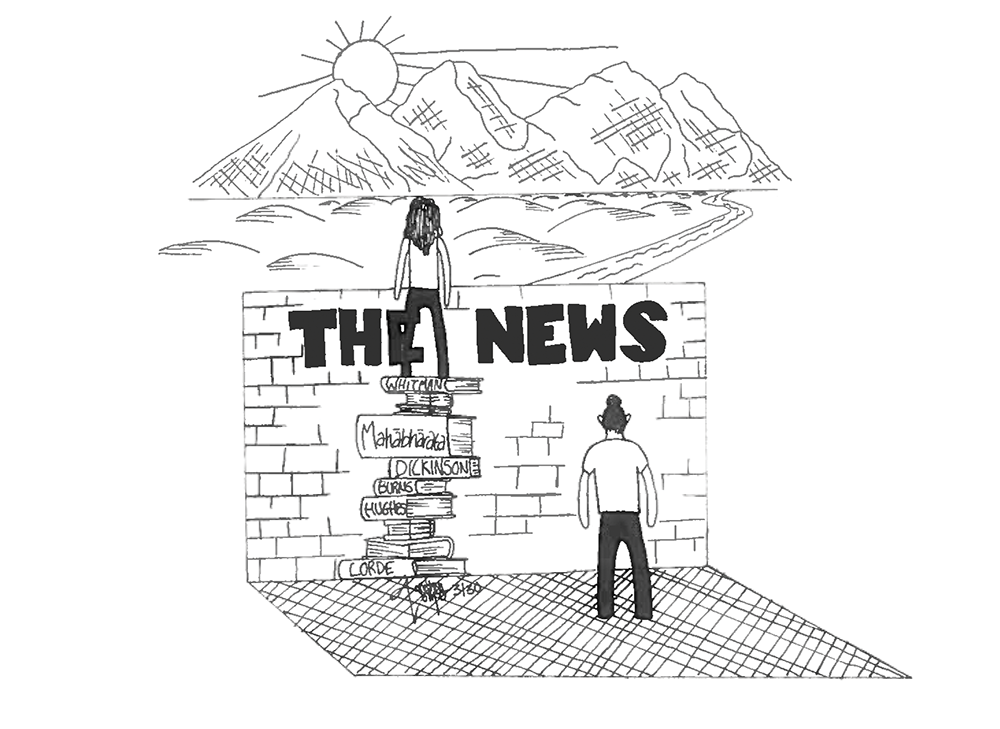In her collection “The Summer Day,” poet Mary Oliver is famous for these lines:
Tell me, what is it you plan to do
with your one wild and precious life?
An invocation to our vulnerability and truest selves, Oliver asks us: What does it mean to live a wild life and to be wild? What do we do when time is so precious? What does it mean to live a fulfilled life?
When we feel fearful, tribal and antagonistic, we need poetry.
We need poetry and its humble wonders.
We need poetry to remind us of our impermanence.
We need poetry to help us to live as better, more generous people. To help us connect to our earth, roots and one another.
Poetry slows down our lives in a world that tells us to speed up. Poetry forces us to consider alternative possibilities in a world that is saturated and obsessed with fast facts, “Breaking News” headlines and definite answers.
Poetry is absence and everything all at once — when poetry reaches out to us, no matter our present circumstance, we are expected to meet it halfway.
Contrary to popular belief, poetry is not uninviting or antiquated; rather, it is an extended invitation to sit at the table. To meet the poet where he or she is. To grapple with personas, elegies, ekphrasis, limericks, tankas, haikus or ghazals.
To sit, and just be with it.
We have grown accustomed to dreading poetry. It is too complex, strange and subjective. Poetry does not matter, because it is too emotional and less objective. It is useless because it is not real life.
But tell me, what is more compassionate and fearful than engaging with a stranger’s lived experience? Or his or her hunger to capture what is whole and broken about our world?
Poetry both fills the gaps and creates the necessary silences. It translates and makes language incomprehensible. It is constricting in its form and it is free. Poetry is not concerned about having the definite answer at the end.
Rather, as Rainer Maria Rilke once wrote in his diary, live the questions now. One’s lostness in the wildness of language is the central narrative. Our idea of knowledge is foolishly seen as attainable. We must be a neophyte, lost in a museum of undiscovered objects.
There is simplicity and wonder in not knowing — poetry is about being grounded and having gratitude, no matter life’s most brutal and unresolved consequences.
In the poem “Thank You,” Ross Gay pens:
If you find yourself half naked
and barefoot in the frosty grass, hearing,
again, the earth’s great, sonorous moan that says
you are the air of the now and gone, that says
all you love will turn to dust,
and will meet you there, do not
raise your first. Do not raise
your small voice against it. And do not
take cover. Instead, curl your toes
into the grass, watch the cloud
ascending from your lips. Walk
through the garden’s dormant splendor.
Say only, thank you.
Thank you.
No matter the war, poetry will be the gift that keeps on giving. No matter the loneliness, a poem will keep you company. No matter the dust and despair, poetry will teach you hope and forgiveness.
My old poetry mentor, Harryette Mullen, wrote one poem a day in her collection “Urban Tumbleweed: Notes from a Tanka Diary.” Out of the 365 tankas that she recorded in Los Angeles, this one compels me to remember what is most essential about our bare lives:
As you have forgotten, so one day
might you remember how to be wild
and bewildered, to be wilder and be wilderness?
In poetry, we see the world as is — the feral, the splendid, the bleak, the simple, the ephemeral and the unknowable.
Poetry forces us to consider beauty, pain and redemption as we walk barefoot in this wild world, together.
Jewel Pereyra is a graduate student in the School of Continuing Studies.




















